Key takeaways:
- Rejections provide valuable insights; understanding festival preferences helps refine submissions and creative choices.
- Constructive feedback from festivals is crucial for growth; embracing diverse perspectives and revising intentionally enhances storytelling.
- Networking with experienced filmmakers fosters genuine relationships and opens doors for learning and collaboration, highlighting that perseverance through rejection is common in the industry.
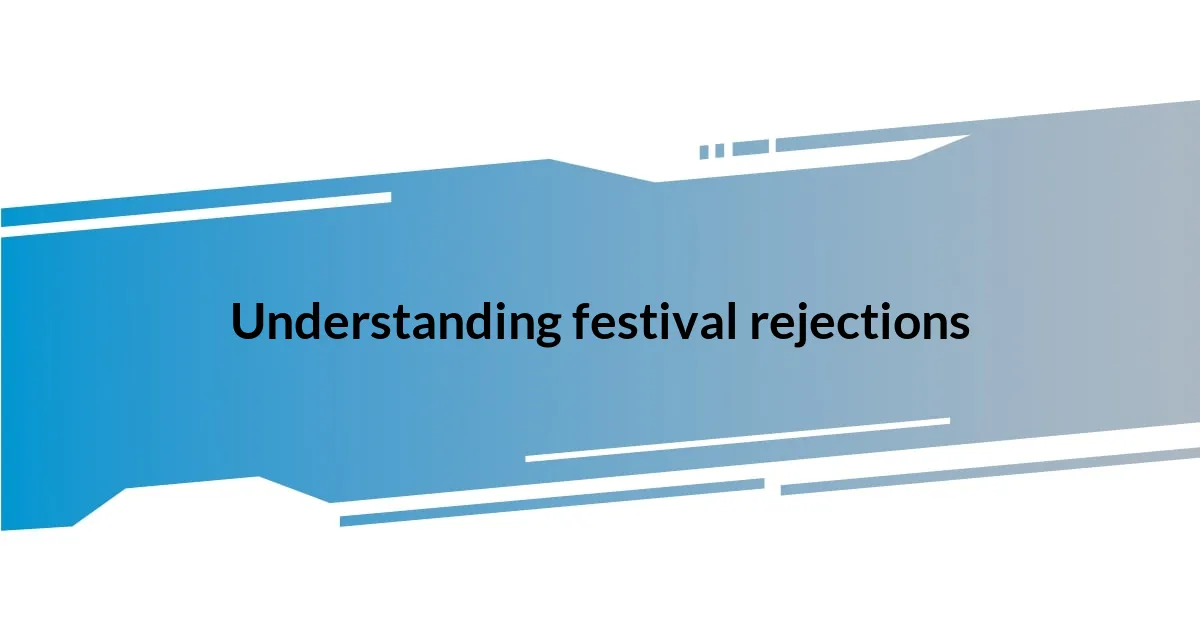
Understanding festival rejections
Festival rejections can feel like a punch to the gut, can’t they? I remember the first time I submitted my work—it was a whirlwind of hope and excitement, only to be met with a curt email that felt almost sterile. That initial sting was hard to shake off; it made me question my talent and, quite frankly, my choices.
What I’ve come to realize is that rejections are not just a reflection of our work but also of the specific context of each festival. Each festival has its own vision, flavor, and set criteria that might not align with what we’re offering. It took me a while to accept that sometimes it’s just about the fit—like that moment when you try on a beautiful dress but realize it’s just not your style.
Thinking back, I’ve learned to embrace rejections as valuable learning experiences. Instead of merely wallowing in disappointment, I started asking myself what feedback I could glean from the process. Did my submission deviate from the festival’s themes? Was my approach too unconventional? By analyzing these questions, I transformed rejection into a stepping stone for improvement, making each subsequent submission more informed and aligned with the festivals I aimed for.
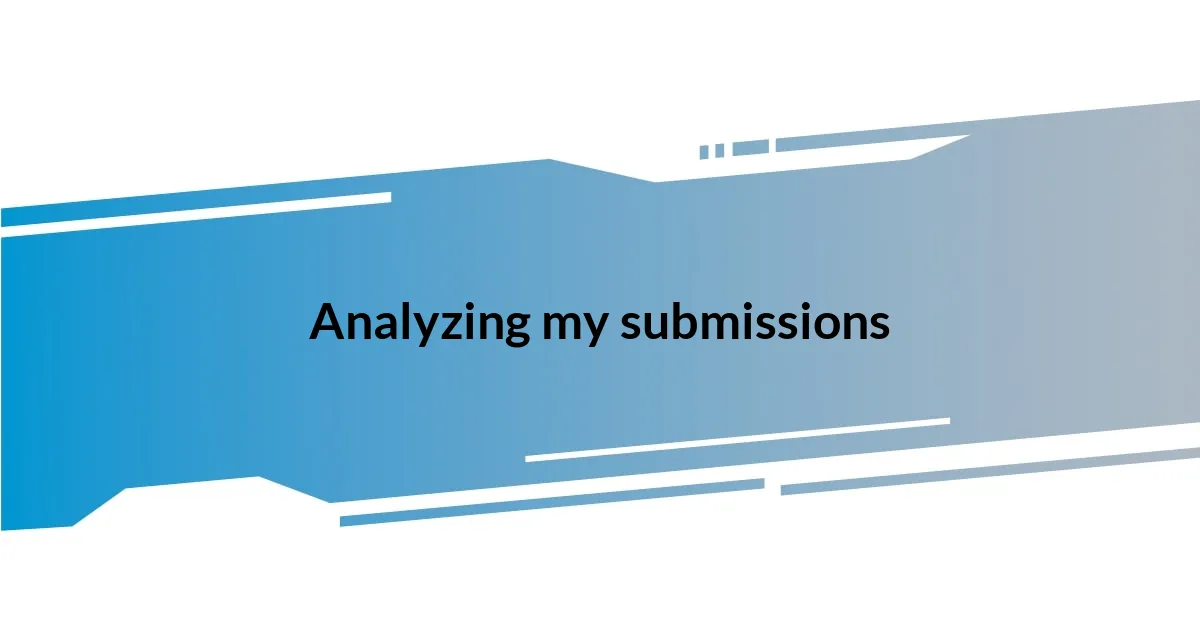
Analyzing my submissions
When I dove into analyzing my submissions, I realized that understanding the nuances of what each festival seeks was crucial. I took a close look at the festivals I targeted and compared my work against their stated mission and past selections. For instance, there was a festival that celebrated avant-garde storytelling, yet my short film, though heartfelt, followed a traditional narrative structure. Recognizing this mismatch made me reflect on my creative choices and how they aligned—or didn’t—with the festival’s vision. This insight made a profound difference in how I approached revisions.
In my quest for improvement, I mapped out a detailed comparison of my submissions. I noted not only the feedback I received but also the content and themes of my projects. I remember one particularly gut-wrenching rejection where I thought my story had the emotional depth to resonate. But after reflecting on the festival’s past selections, it became clear that they favored experimental formats that diverged from standard storytelling. This revelation not only set me on a path to refine my artistic style but also opened my eyes to explore new genres that better suited festival preferences.
I’ve also learned the importance of presentation in my submissions. I recall submitting a project that I felt was polished, only to realize later that my cover letter felt rushed and lacked a personal touch. This detail seemed small, yet it played a significant role in how my work was perceived. A well-thought-out submission can frame your film in a more favorable light, making the festival more inclined to see beyond the surface. Now, I approach each submission with not just my work, but a cohesive narrative that connects my vision with the festival’s ethos.
| Submission Details | Festival Vision |
|---|---|
| Traditional storytelling | Avant-garde emphasis |
| Heartfelt narrative | Experimental formats |
| Polished project, rushed cover letter | Need for personal connection |
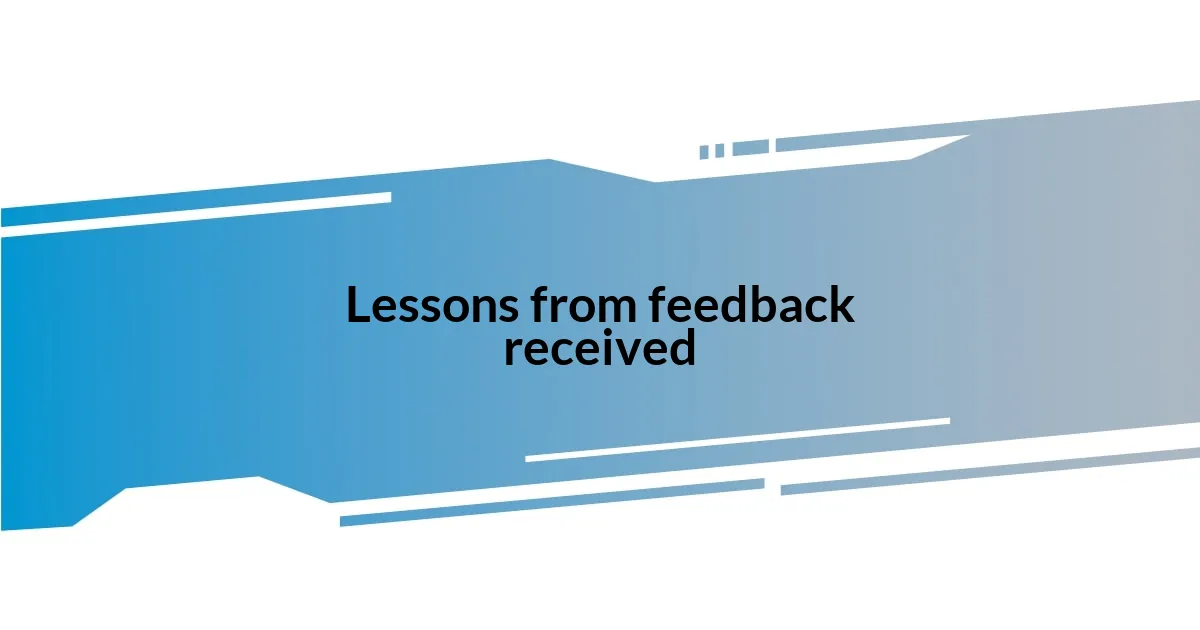
Lessons from feedback received
Receiving feedback from festival submissions taught me that constructive criticism can be a powerful tool for growth. I vividly recall a festival that rejected my film but included a line mentioning their preference for tighter editing. At first, I felt a flicker of resentment, thinking my pacing was intentional. However, after letting it simmer, I re-watched my piece with fresh eyes. That feedback nudged me to refine my editing skills, enabling me to distill my films down to their most impactful moments. Suddenly, rejections didn’t feel like endings but rather invitations to evolve.
To distill my learnings, here’s what I’ve taken away from the feedback received:
- Focus on clarity: Feedback often reveals areas where my message may be muddled. I’ve learned to prioritize clear, concise storytelling.
- Embrace diverse perspectives: Each piece of feedback is a window into the festival’s preferences and audience expectations. Seeking different opinions can enrich my understanding.
- Revise with intention: When I receive feedback, I pinpoint specific areas of critique and revise with a purpose, ensuring growth with each iteration.
- Stay open-minded: That first sting of rejection can blind us; I now force myself to approach feedback with an open heart and mind, viewing it as a pathway, not a hurdle.
- Personalize my submissions: Feedback has taught me that a tailored approach to cover letters—reflecting genuine enthusiasm for the festival—can leave a lasting impression. This has become a standard part of my submission process.
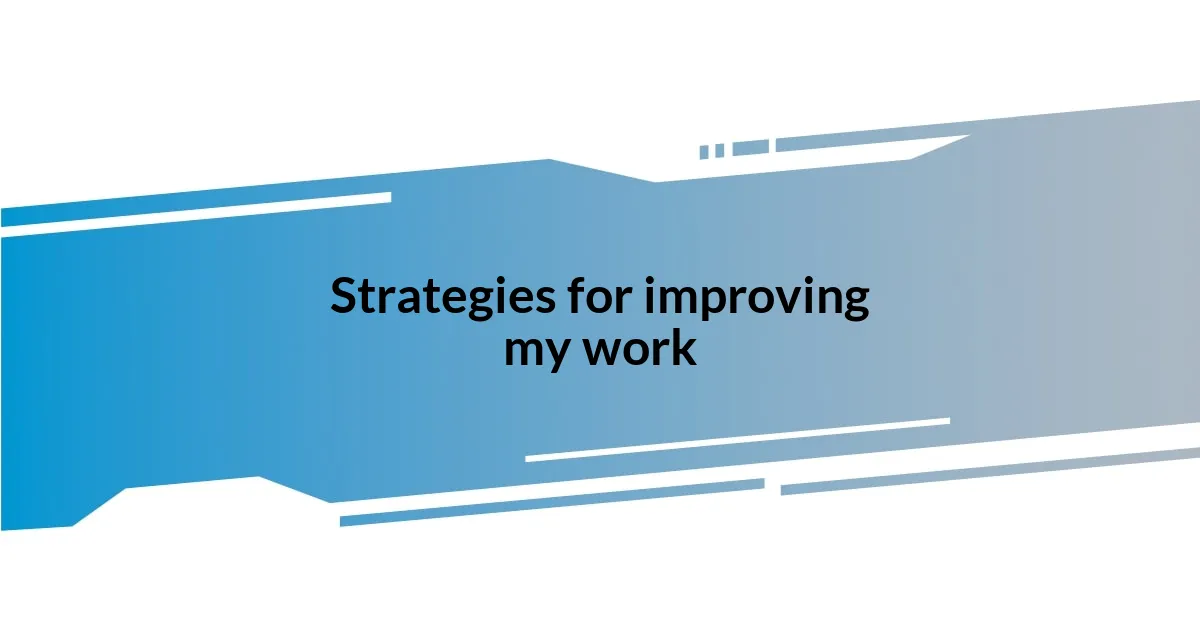
Strategies for improving my work
I believe one of the most effective strategies for improving my work lies in collaboration. After a particularly disheartening rejection last year, I reached out to fellow filmmakers for feedback on my script. Their diverse perspectives illuminated blind spots I hadn’t noticed, igniting a creative spark I had been missing. Have you ever thought about how a fresh set of eyes can completely change your narrative? Since then, I’ve made it a point to work closely with others, recognizing that collaboration often leads to richer storytelling.
Another critical approach I’ve adopted is embracing a growth mindset. There was a time when I viewed rejection as a verdict on my worth as a creator. However, I shifted that narrative when I remembered a quote that resonated deeply: “Failure is simply the opportunity to begin again, this time more intelligently.” By viewing each setback as a learning experience, I started exploring areas where I felt least confident. For instance, I took a workshop on sound design, an aspect of filmmaking I had previously overlooked. This not only refined my skills but also enriched the overall quality of my projects.
Lastly, I’ve learned the value of experimentation. I distinctly recall submitting a dark, atmospheric short film only to hear that festivals were embracing lighter stories that year. Instead of feeling defeated, I took it as a cue to try something new. I experimented with a vibrant, comedic script that surprised even my closest friends. Venturing outside my comfort zone not only revitalized my creative process but also resulted in a project that won accolades at a subsequent festival. Isn’t it fascinating how stepping outside our usual boundaries can lead to unexpected triumphs?
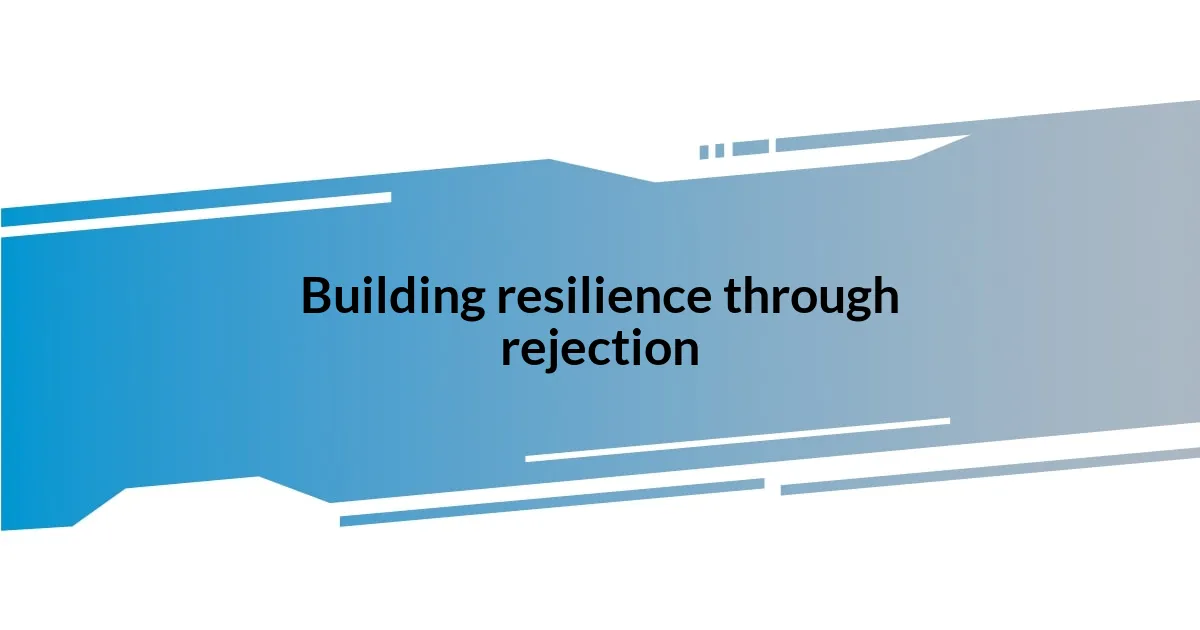
Building resilience through rejection
Building resilience is often forged in the fires of rejection. I remember submitting my first short film to a festival that felt like the pinnacle of my career at that point. The rejection hit me hard, and I felt like my entire passion was being dismissed. However, rather than retreating, I chose to analyze what went wrong. I began to see rejection not as a defining moment, but as a stepping stone. This shift in perspective transformed my approach; I learned to bounce back stronger, making resilience my ally in this unpredictable journey.
In those early days, I often imagined myself as a fragile glass figure, vulnerable to every critique and rejection. But with each setback, I slowly discovered that resilience is about building layers of strength. I vividly recall a time when a rejection conveyed that my narrative lacked depth. At first, I was crushed, but by reflecting on the feedback, I found that I could add layers to my characters, enhancing both the story and my creative voice. Wasn’t it liberating to realize that each rejection came with the possibility of finding new ways to express myself?
Resilience isn’t a one-time achievement; it’s an ongoing process. Whenever another rejection rolls in, instead of crumbling, I embrace a moment of vulnerability. I remind myself that even the most accomplished filmmakers have faced repeated no’s. What if I viewed each rejection as a badge of honor—a sign that I was daring to push boundaries? Over time, I’ve realized that this mindset allows me to cultivate resilience, empowering me to keep creating and submit my work fearlessly. Isn’t it intriguing how resilience can turn the sting of rejection into motivation for growth?
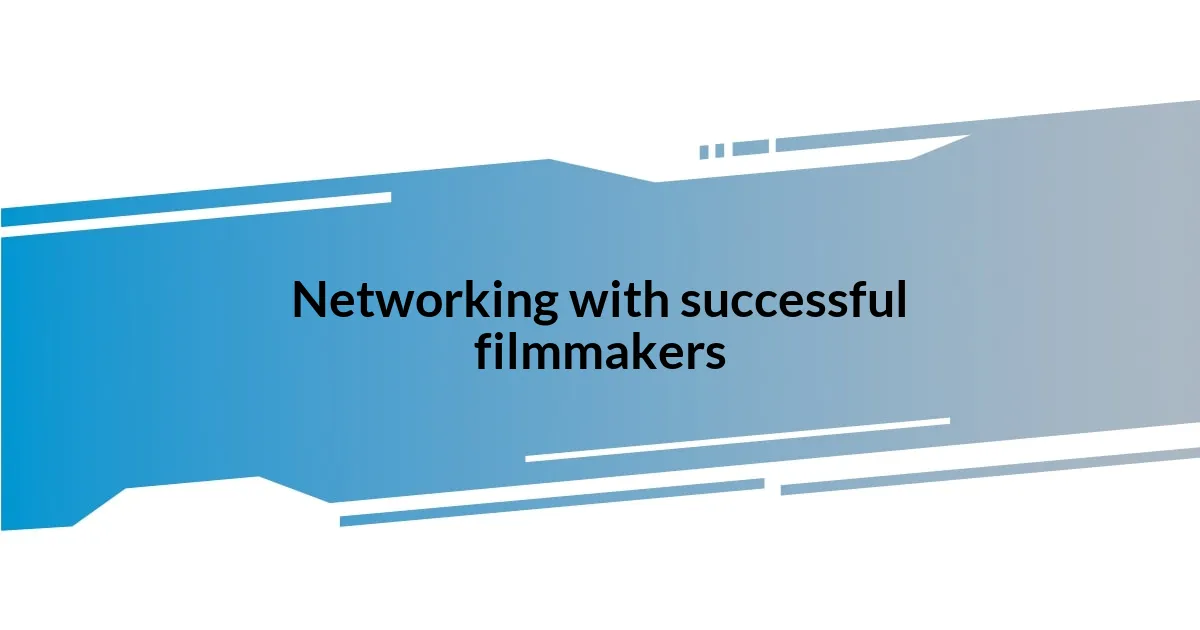
Networking with successful filmmakers
Networking with successful filmmakers has always felt like a double-edged sword to me. I recall attending a local film festival where I half-heartedly approached a filmmaker whose work I deeply admired. Initially, I was overwhelmed by a mix of excitement and anxiety. However, as we chatted, I learned that even they experienced rejection and doubt. It was a reminder that behind every successful project lies a tapestry of failures and persistence. Have you ever found solace in a stranger’s story? It can be astonishing how connections blossom when we share our vulnerabilities.
In another instance, I made it a point to connect with a mentor who had years of industry experience. From our very first coffee meet-up, I felt an invigorating sense of purpose. They generously offered insights about networking, emphasizing that real relationships go beyond exchanging business cards. I began to understand that asking questions and genuinely listening builds bridges. When I followed up with a simple thank-you email, I realized it wasn’t just a good deed; it began to forge a lasting connection. What if every interaction could lead to unexpected opportunities?
During a workshop, I noticed a filmmaker whose short film had won numerous awards. I took a bold step and asked if they’d be open to discussing their journey. Surprisingly, they agreed, and what followed was a heartwarming exchange of experiences and tips. I came to appreciate that networking isn’t just about seeking favors but fostering genuine relationships. I think about that conversation often—what lessons we share can create ripples in someone else’s journey. How might your next conversation change your perspective?
